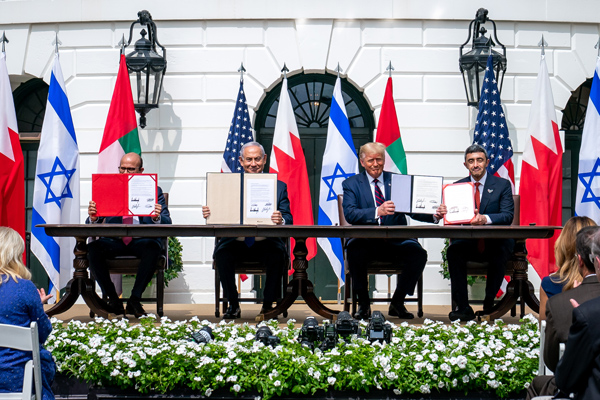
November 15, 2024
In the wake of his re-election, President-elect Donald Trump has reiterated his administration’s strong stance on combating antisemitism and advancing peace in the Middle East. Trump’s policies during his first term, including adopting the International Holocaust Remembrance Alliance (IHRA) Working Definition of Antisemitism and brokering the Abraham Accords, have laid the groundwork for his ambitious vision of regional stability and religious tolerance.
Tackling Antisemitism
Under the Trump administration, the IHRA definition was used assertively to address antisemitism in educational institutions under Title VI of the Civil Rights Act of 1964. This included measures to hold anti-Zionists accountable and ensure that laws against discrimination based on race, color, and national origin also applied to religious discrimination.
In 2019, Trump signed an executive order to combat antisemitism, further emphasizing the protection of Jewish communities. The recent surge of antisemitic incidents on college campuses, particularly following the October 7 terror attacks, prompted Trump to issue a stern warning: “Colleges will and must end the antisemitic propaganda or they will lose their accreditation and federal support.”
Recognizing Jerusalem as Israel’s Capital
Early in his first term, Trump fulfilled a decades-long promise by officially recognizing Jerusalem as Israel’s capital and relocating the U.S. Embassy from Tel Aviv. This historic decision implemented the 1995 Jerusalem Embassy Act, which had been deferred by previous administrations. Trump’s move not only underscored Israel’s sovereignty over its capital but also inspired other nations, including Guatemala and Honduras, to follow suit.
The Abraham Accords: A Historic Leap for Peace
The Abraham Accords, signed under Trump’s leadership in 2020, marked the first Middle East peace agreement in over 25 years. Facilitated by the United States, the accords normalized relations between Israel and four Arab nations: the United Arab Emirates, Bahrain, Morocco, and Sudan. Since then, trade between these nations has exceeded $10 billion, and over a million people have traveled between the countries.
In addition to diplomatic relations, the accords fostered regional security cooperation. In April 2024, joint air defense systems involving Israel, the U.S., and Arab nations successfully countered missile attacks from Iran, showcasing the accords’ strategic impact.
Trump also organized the Peace to Prosperity Conference to explore economic opportunities for Palestinians and released a comprehensive Trump Peace Plan. While the plan was rejected by the Palestinian leadership, it remains the only peace proposal accepted by Israeli Prime Minister Benjamin Netanyahu in recent years.
Future Plans: Expanding the Abraham Accords
President-elect Trump has identified the expansion of the Abraham Accords as a top priority for his upcoming term. In an interview with Al Arabiya, Trump claimed he could have added “12 to 15 countries” to the agreements had he won re-election in 2020. He pledged to prioritize these efforts, describing them as “peace in the Middle East — something we need.”
Despite his focus on diplomacy, Trump reaffirmed his commitment to avoiding unnecessary military conflicts. In his victory speech, he stated, “I’m not going to start wars; I’m going to stop wars.”
A Vision for the Future
As Trump prepares to take office in January, his policies on antisemitism, religious tolerance, and Middle East peace continue to shape his agenda. His efforts underscore a broader vision of a more stable and cooperative global landscape, rooted in respect for faith and the pursuit of lasting peace.